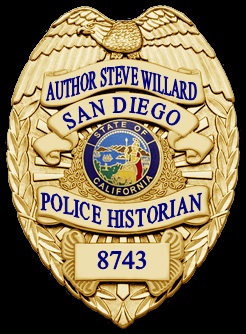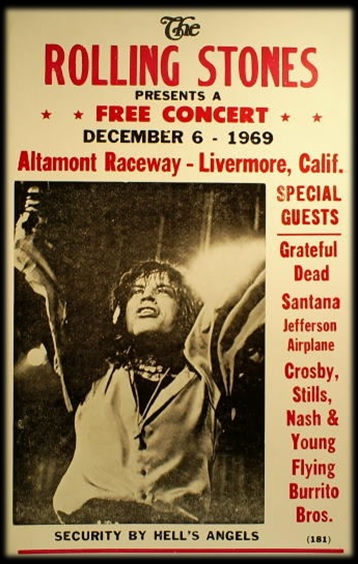

Quantifying the exact moment when a generation ended is impossible. That said, if there’s a single event that killed the “tune in, turn on and drop out” mentality of the free love 1960’s, it was perhaps Altamont.
December 6, 1969. Tracy California. Billed as a West Coast Woodstock, the huge outdoor, multi day concert held in Bethel New York just four months earlier, the Altamont Speedway hosted some of the biggest musical acts of the time including The Grateful Dead, Santana, The Flying Burrito Brothers, Jefferson Airplane and Crosby, Stills, Nash & Young. The Rolling Stones were the final act.
However well intended, Rolling Stone Magazine would later opine that Altamont was, “Rock and Rolls worst all time day. A day when everything went perfectly wrong."
Stefan Ponek, an on air personality for San Francisco radio station KSAN reported, “The Stones tour of the United States is over. It ended with a free concert at Altamont. There were four births, four deaths and many scuffles.”
To add to the mayhem, the Associated Press published photos of audience members looking on as several Hells Angels beat concert goers with pool cues.
So what went wrong?
First was the venue. Unlike traditional concerts where musicians preform on an elevated stage, Altamont went the opposite direction. Performers staged in the center of the track, below the crowd line. This placed the musicians downhill from 300,000 young, drug fueled fans.
Things got worse when the Rolling Stones hired the Hells Angels as security for the event and paid them with $500 worth of beer.
In a follow up documentary about Altamont, Oakland Hells Angels chapter founder/president Sonny Barger later said the motorcycle club wasn’t interested in policing the event. The bikers just sat on the edge of the stage, drinking to make sure there weren't any murders or rapes.
Sam Cutler, the manager of the Stones 1969 road tour, confirmed, "The Angels made sure nobody tampered with the generators but that was the extent of it. They weren’t supposed to be a police force or anything like that.”
In retrospect, with such a low threshold, it’s no surprise mayhem ensued. One concert attendee reported numerous fistfights near the stage and the Angels were involved in all of them. The attendee claimed when she tried to speak out, she was threatened with violence.
Santana was the first act. Their performance went smoothly however, with the Angels sitting drinking beer all day, most became very drunk. They weren’t the only ones. With drugs and booze free flowing through the crowd, the concertgoers began attacking each other, the Angels and the performers.
After the crowd toppled a biker’s motorcycle, the club became even more aggressive, including toward the performers. Marty Balin of Jefferson Airplane jumped off stage to attempt to sort out the problem, only to be punched in the head and knocked unconscious by an Angel.
After hearing about Balin, the Grateful Dead quit the event.
When the Rolling Stones took the stage just before sundown they were greeted by almost 5,000 drunk and stoned fans jammed at the edge of the stage.
The crowd quickly grew rowdy as the English quintet began playing. In the 1970 Altamont documentary entitled Give Me Shelter, Stones lead singer Mick Jagger was visibly intimidated. Repeatedly, he urged everyone to, "Be cool down in the front there! Don't push." By the third song, "Sympathy for the Devil", a fight erupted at the foot of the stage, prompting the Stones to stand motionless as they waited for the Angels to restore order.
Calm was eventually restored and the Stones continued their set. Things went smoothly until the start of "Under My Thumb" and 18-year-old Meredith Hunter tried to storm the stage. One of the Angels punched Hunter then chased him back into the crowd.
According to his girlfriend, even though Hunter was so inebriated he could barely walk he pushed his way to the front of the crowd and drew a .22 caliber revolver from his jacket. Angel Alan Passaro, saw the gun then pulled a knife and stabbed him five times.
The Rolling Stones were aware of the skirmish but not the stabbing. Mick Jagger recalled, "You couldn't see anything, it was just another scuffle." Jagger added the Stones felt if they abandoned the show, the crowd would become even more unruly, leading to more violence.
Videographer Eric Saarinen had been recording the concert. A week later he was reviewing his footage when he realized he’d captured the homicide. The footage only lasted several seconds but Hunter can clearly be seen holding the gun. Passaro is also visible as he delivered two stabs then shoves Hunter off-screen. Witnesses later told homicide detectives that Hunter was stomped on by several Angels while he was on the ground. Police recovered the gun and an autopsy later determined Hunter was high on meth when he died.
Passaro was arrested for murder in the summer of 1971. After the jury viewed footage showing Hunter brandishing the revolver they concluded Passaro acted in self-defense and acquitted him.
In later interviews, Sonny Barger threw most of the blame for what happened at Altamont at Mick Jagger. “That idiot’s responsible for what happened. I aint no cop and I never pretended to be a cop. This (Altamont) is all his fault. The Angels were duped.”
In fairness to the Rolling Stones, prior to Altamont they’d performed hundreds of concerts without incidents across the world.
In 2003, the Alameda County Sheriff opened an investigation into the possibility of a second Hells Angel having taken part in the stabbing. The case was closed on May 25, 2005, citing insufficient evidence.
Apparently old grudges die hard. In 2008, Former FBI Agent Mark Young revealed the Hells Angels had plotted to murder Mick Jagger over the Altamont concert. According to Young, the Hells Angels members boarded a boat and were planning to enter Jagger's home to kill him. Young alleged poor weather at sea spoiled the assassination plot and Jagger was never informed of his brush with death.
The 60’s were officially over.




The crowd was within a few feet of the band as Mick Jagger belted out Sympathy for the Devil."

